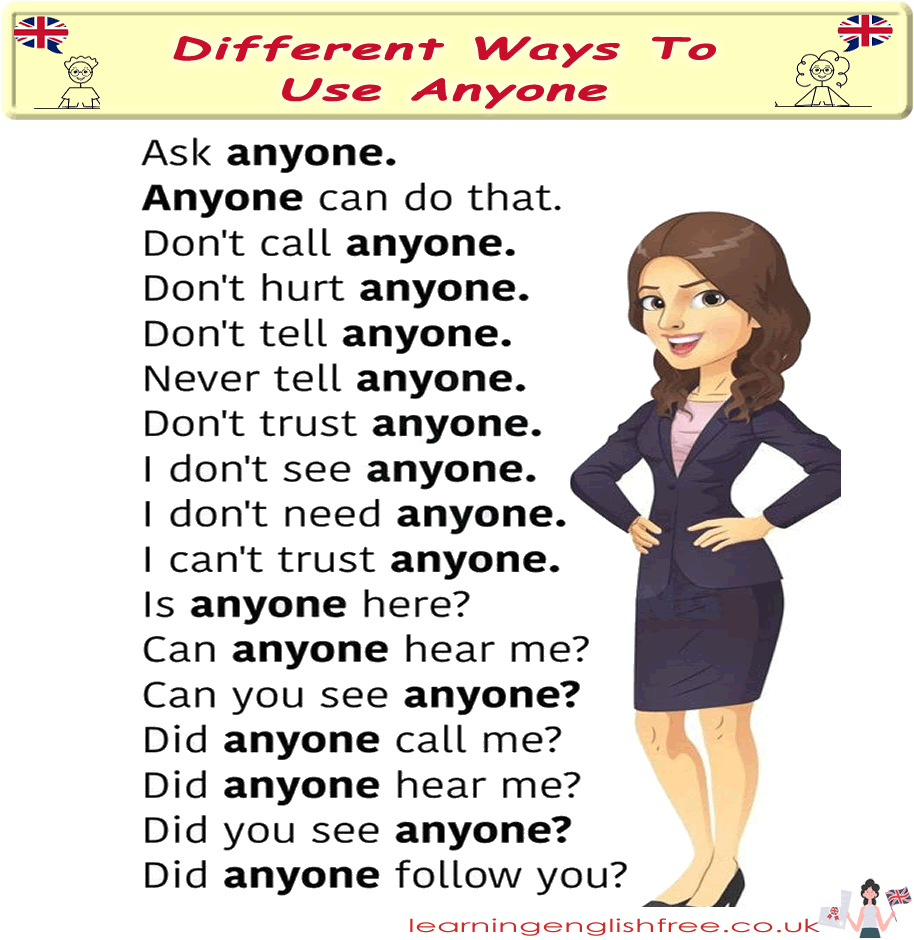
Exploring the Versatility of "Anyone" in English Conversations
Welcome to our detailed lesson aimed at ESL learners focusing on the word "anyone" and its various contexts and uses in English. This seemingly simple word holds significant power in communication, capable of expressing inquiries, permissions, exclusions, and more. By understanding how to properly use "anyone," you can greatly improve both your spoken and written English. Let's dive into the nuances of "anyone" and unlock new levels of language proficiency together.
Understanding "Anyone": Contexts and Examples
-
Ask anyone
- Meaning: To suggest that the answer or solution can be obtained from any person.
- Example: If you're lost, ask anyone for directions.
-
Anyone can do that
- Meaning: To express that the task is easy and can be done by any person.
- Example: It's so simple; anyone can do that.
-
Don't call anyone
- Meaning: A request or instruction not to contact any person.
- Example: It's late; don't call anyone now.
-
Don't hurt anyone
- Meaning: An admonition to avoid causing harm to any person.
- Example: Please be careful with your words; don't hurt anyone.
-
Don't tell anyone
- Meaning: A request to keep information confidential and not share it with any person.
- Example: This is a secret; don't tell anyone.
-
Never tell anyone
- Similar to "Don't tell anyone" but with a stronger emphasis on the permanence of keeping the information secret.
- Example: This must stay between us; never tell anyone.
-
Don't trust anyone
- Advice or a warning to be cautious about placing confidence in any person.
- Example: In this business, don't trust anyone too quickly.
-
I don't see anyone
- A statement indicating that the speaker does not notice any person in a particular location.
- Example: I checked the room, but I didn't see anyone.
-
I don't need anyone
- A declaration of independence suggests the speaker does not require assistance or company from any person.
- Example: I can handle this on my own; I don't need anyone.
-
I can't trust anyone
- A personal expression of the inability to place trust in any person.
- Example: After what happened, I can't trust anyone.
-
Is anyone here?
- A question asked to ascertain if any person is present in a certain location.
- Example: Hello, is anyone here?
-
Can anyone hear me?
- A question often used in situations where the speaker is unsure if their voice is being heard by any person.
- Example: I'm stuck; can anyone hear me?
-
Can you see anyone?
- A question inquiring if the listener can visually detect the presence of any person.
- Example: From your viewpoint, can you see anyone?
-
Did anyone call me?
- A question asking if any person has attempted to contact the speaker during their absence.
- Example: I was away; did anyone call me?
-
Did anyone hear me?
- A question to check if any person heard what the speaker said.
- Example: I announced the news; did anyone hear me?
-
Did you see anyone?
- A query regarding whether the listener saw any person, typically in the context of looking for someone.
- Example: When you arrived, did you see anyone?
-
Did anyone follow you?
- A question expressing concern or suspicion about being followed by any person.
- Example: This place is a bit secluded; did anyone follow you?
Conclusion / Summary and Takeaways
Today's exploration of "anyone" has unveiled its flexibility and importance in English communication. From asking for help to expressing feelings of trust or the lack thereof, "anyone" is a key player in constructing meaningful, context-rich sentences.
Key Takeaways:
- Practice Regularly: Incorporate "anyone" into your daily English conversations to become comfortable with its various uses.
- Visual Learning: Create flashcards with each example sentence to visualize different contexts where "anyone" can be applied.
- Memory Aids: Use sticky notes around your study area with "anyone" sentences to frequently remind yourself of its uses.
- Real-World Application: Listen for "anyone" in movies, songs, and conversations around you to understand its application in real-life scenarios.
Remember, mastering the use of "anyone" and other similar words can significantly enhance your English fluency. Share your progress and discoveries with us on our Facebook page www.facebook.com/learningenglishfree.co.uk for more insights and support from our learning community.
